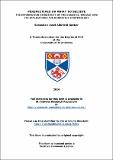Files in this item
Perspectives on what to believe : the information-sensitivity of the doxastic 'should' and its implications for normative epistemology
Item metadata
| dc.contributor.advisor | Brown, Jessica (Jessica Anne) | |
| dc.contributor.advisor | McGrath, Matthew | |
| dc.contributor.advisor | Egan, Andy | |
| dc.contributor.author | Becker, Sebastian Josef Albrecht | |
| dc.coverage.spatial | vi, 221 p. | en_US |
| dc.date.accessioned | 2016-11-28T15:24:35Z | |
| dc.date.available | 2016-11-28T15:24:35Z | |
| dc.date.issued | 2016-12-01 | |
| dc.identifier.uri | https://hdl.handle.net/10023/9890 | |
| dc.description.abstract | This thesis explores the extent to which the doxastic ‘should’ is information-sensitive and the implications of this for a number of debates in normative epistemology. The doxastic ‘should’ is a special case of the deontic modal ‘should’ and occurs in sentences such as ‘You shouldn’t believe everything you read online’. In the recent semantics literature, it has been suggested that the deontic ‘should’ is information-sensitive, meaning that sentences of the form ‘S should do A’ are relativized to information-states. After a short introductory chapter, I survey the relevant semantics literature in chapter 2 and provide a simplified contextualist semantics for the doxastic ‘should’, according to which the truth-conditions of sentences containing the doxastic ‘should’ vary with the information-state provided by their context of utterance. In chapters 3 to 6, I discuss the different kinds of information-states the doxastic ‘should’ can be relativized to and how the respective relativization matters for normative epistemology. Chapter 3 argues that the doxastic ‘should’ has a subjective and an objective sense and that this distinction solves the apparent conflict between subjective epistemic norms and the truth norm for belief. Chapter 4 addresses the question of how one should react to misleading higher-order evidence. I propose that two seemingly opposing views on this issue, Steadfastness and Concilliationism, are both correct. In a sense of ‘should’ that is relativized to one’s first-order evidence, one should remain steadfast in the face of misleading higher-order evidence, but in another sense, which is relativized to one’s higher-order evidence, one shouldn’t. In chapters 5 and 6, I argue that when we advise others on what they should believe, we talk about what they should believe in light of their and our joint evidence. Chapter 7 concludes this thesis with a defence of contextualist semantics for the doxastic ‘should’ against truth-relativist challenges. | en_US |
| dc.language.iso | en | en_US |
| dc.publisher | University of St Andrews | |
| dc.rights | Attribution-NonCommercial-NoDerivatives 4.0 International | * |
| dc.rights.uri | http://creativecommons.org/licenses/by-nc-nd/4.0/ | * |
| dc.subject | Epistemic norms | en_US |
| dc.subject | Contextualist semantics for the doxastic should | en_US |
| dc.subject | Higher-order evidence | en_US |
| dc.subject | Epistemic advice | en_US |
| dc.subject | Semantics for the deontic should | en_US |
| dc.subject.lcc | BD415.B436 | |
| dc.subject.lcsh | Knowledge, Theory of | en |
| dc.subject.lcsh | Belief and doubt | en |
| dc.subject.lcsh | Norm (Philosophy) | en |
| dc.title | Perspectives on what to believe : the information-sensitivity of the doxastic 'should' and its implications for normative epistemology | en_US |
| dc.type | Thesis | en_US |
| dc.contributor.sponsor | St Andrews and Stirling Graduate Programme in Philosophy (SASP) | en_US |
| dc.type.qualificationlevel | Doctoral | en_US |
| dc.type.qualificationname | PhD Doctor of Philosophy | en_US |
| dc.publisher.institution | The University of St Andrews | en_US |
The following licence files are associated with this item:
This item appears in the following Collection(s)
Except where otherwise noted within the work, this item's licence for re-use is described as Attribution-NonCommercial-NoDerivatives 4.0 International
Items in the St Andrews Research Repository are protected by copyright, with all rights reserved, unless otherwise indicated.


